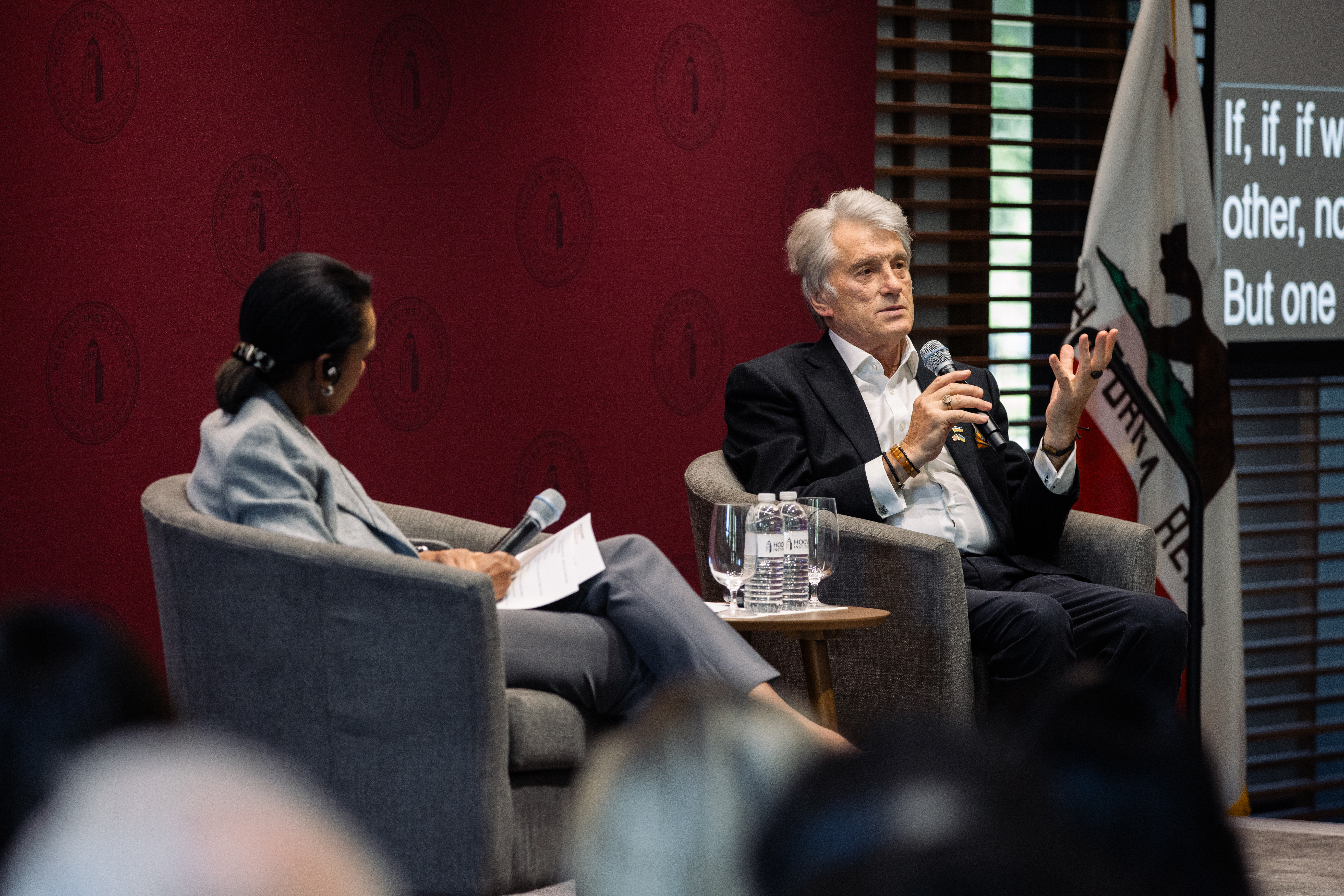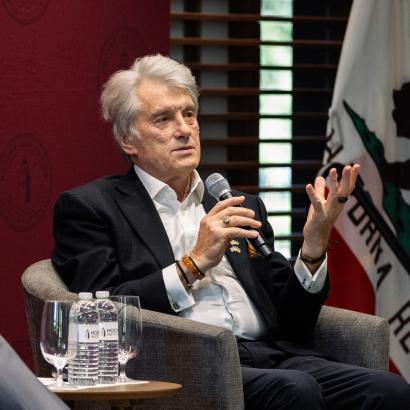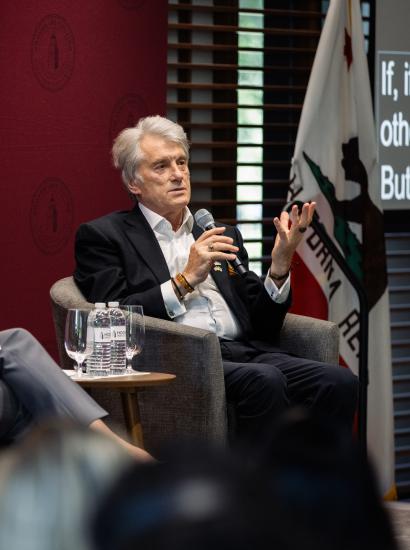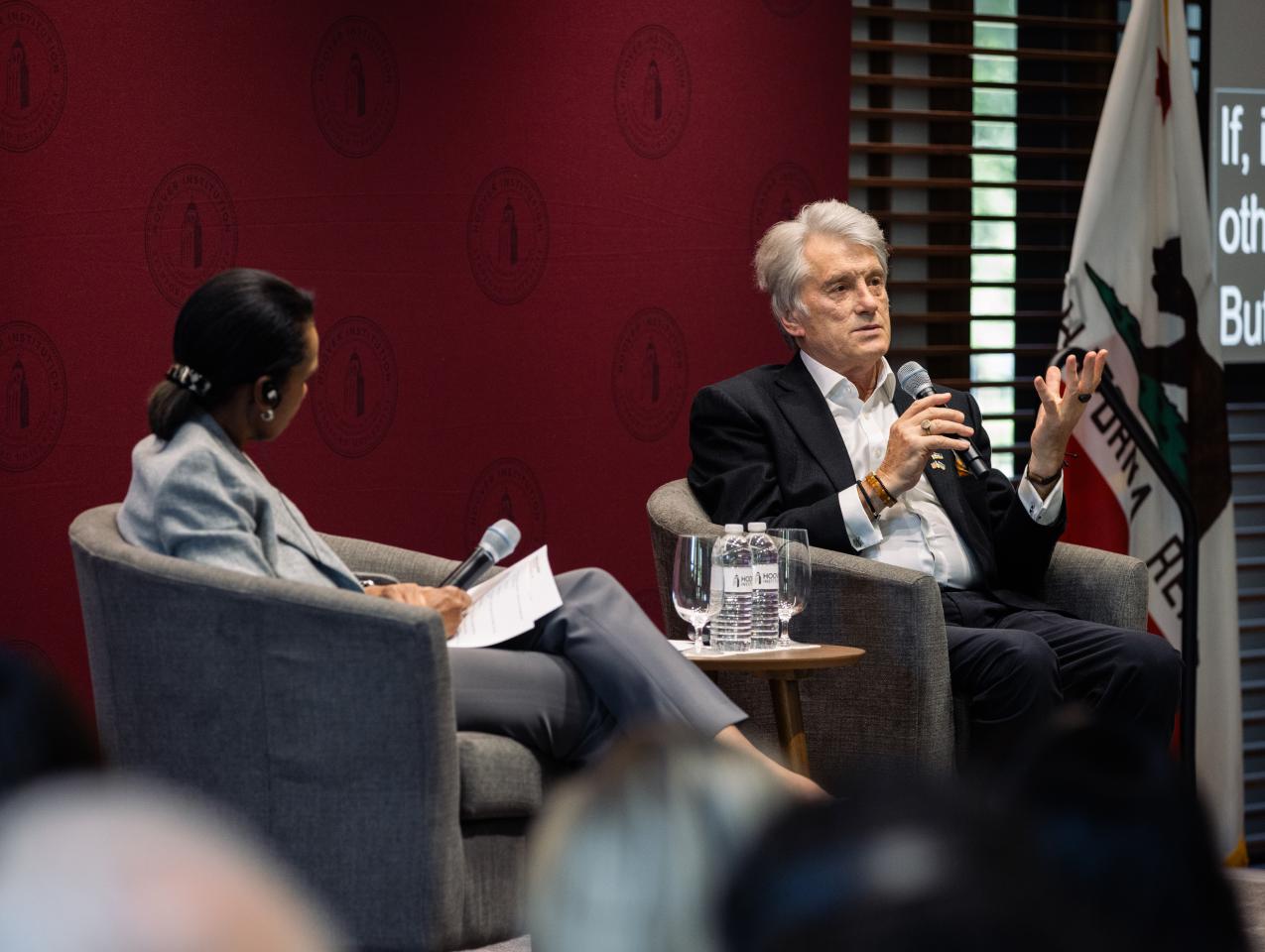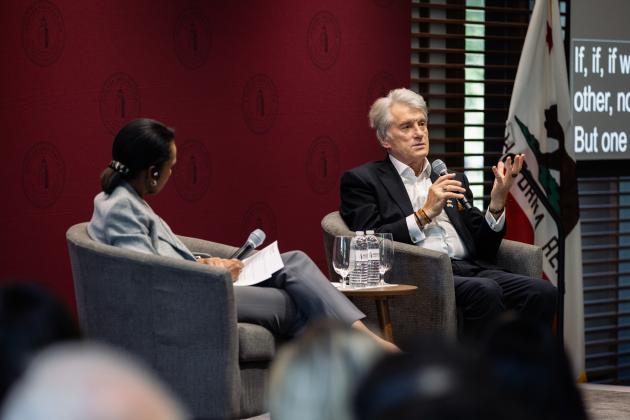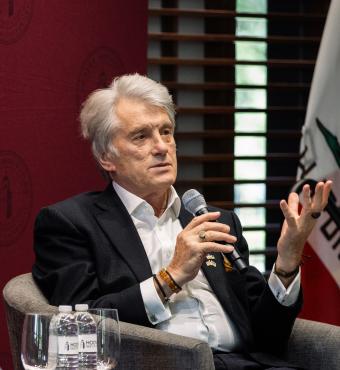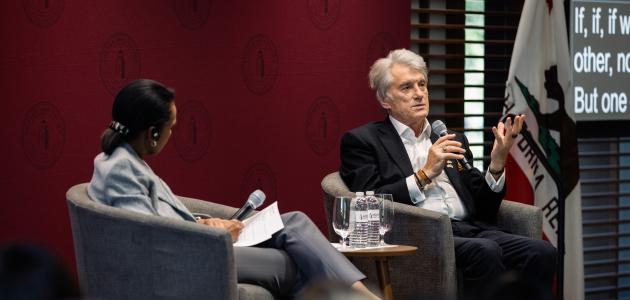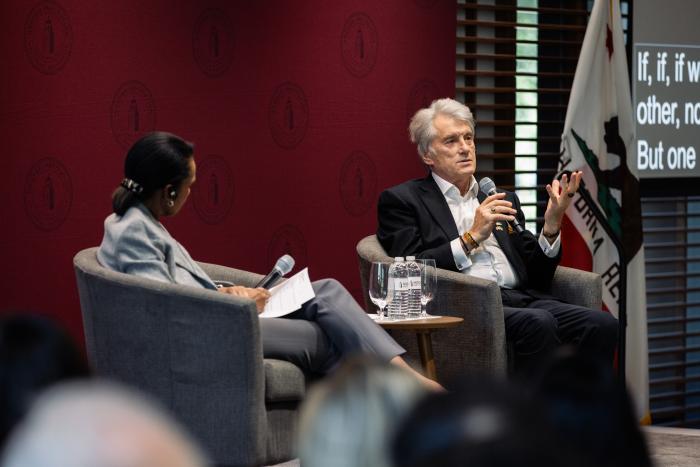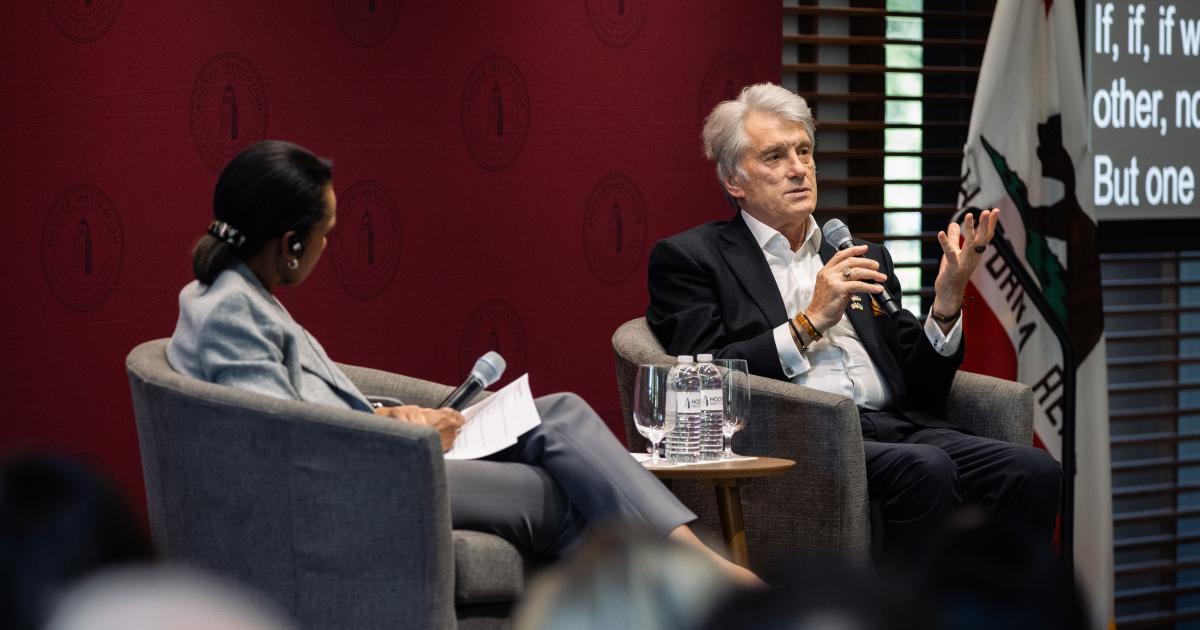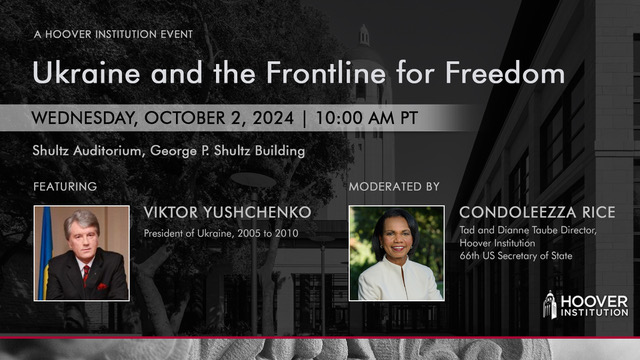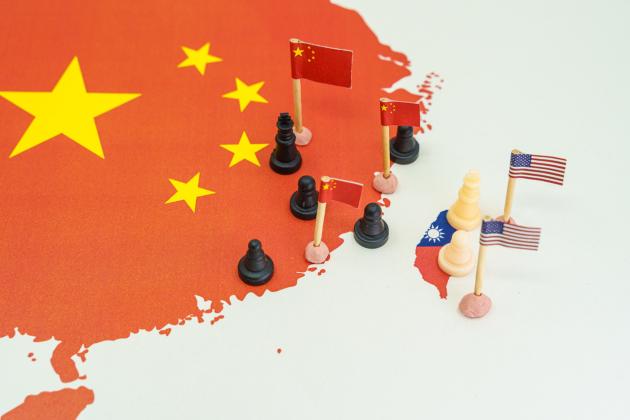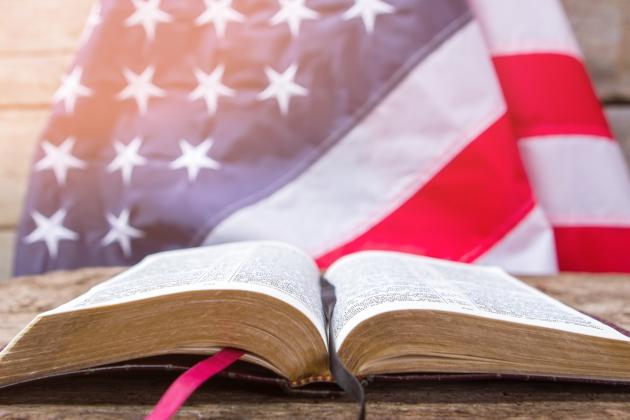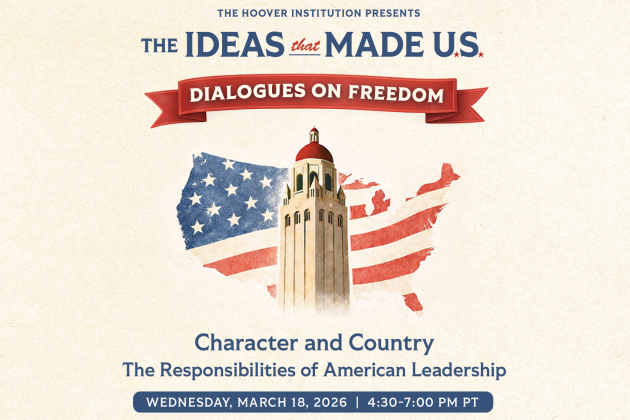Former President of Ukraine Viktor Yushchenko on “Ukraine and the Frontline for Freedom”, followed by a Q&A with Secretary Condoleezza Rice, Director of the Hoover Institution on Wednesday, October 2, 2024 at Shultz Auditorium, George P. Shultz Building at the Hoover Institution.
>> Condoleezza Rice: Welcome to the Hoover Institution. I think many of you know I'm Condoleezza Rice, I'm the Director of the Hoover Institution. I just wanna say a word about Hoover, which is that we're an organization committed to producing the highest quality research and disseminating those ideas for some of the toughest policy problems that the world faces, that the country faces.
I very often say that the good news is that this is a good time for Hoover, but the bad news is this is a good time for Hoover because we have many, many problems that we address. We are a renowned library and archive, and we try to preserve the historical record in order to inform the future.
And we carry out that mission of our founder, Herbert Hoover, who said that we should try to improve the human condition. Now today, I'm gonna have the honor of being on stage and introducing you to a gentleman who has done a lot to improve the human condition. Our special guest today served as President of Ukraine from 2005 to 2010, he was educated as an economist.
He worked in banking and finance for much of his career. In 1991, after Ukrainian independence was restored, he became Governor of Ukraine's central bank. He served as Prime Minister from 1999 to 2001, and then headed the Ukrainian opposition in parliament from 2002 to 2005. I think it is also well-known that he survived an assassination attempt in 2004.
And we're very fortunate that he survived because he continues to be a voice for freedom, for democracy, for market reform, for European integration, and for national consciousness of the Ukrainian people. After President Yushchenko makes a few remarks, we are then going to have a bit of a conversation.
I just want to say, too, welcome to Kateryna, his wife who is in the front row there, and I understand that his daughter, Sofia, who is a Stanford student, is in class, so good for her. And now, I will turn it over to President Yushchenko.
>> Viktor Yushchenko: Dear Condoleezza, dear guests, it's a big honor for me to be here with you.
My first words is the words of appreciation to your nation, to the United States of America. For the compassion, for the support that Ukraine and Ukrainian people feel today. Honestly, I would like to start my conversation with you with the following. Do you know that Ukraine gave birth to the family of Tchaikovsky?
That the best of his work, Petro Ilych wrote in Ukraine? Do you know that Ukraine gave birth to such a beloved in United States, Anton Pavlovich Chekhov? Do you know that Ukraine gave birth to Mykola Vasilievich Gogol? Do you know that Ukraine gave birth to the best artists, starting with Ilya Repy, or Repin, how the Russia made him?
He is the Rembrandt of 19th and 20th century. Do you know that Ukraine gave birth to Malevich? Do you know that Ukraine gave birth to Sirkorsky? Do you know that Ukraine gave birth to Korolev, who had launched the world's first satellite and who launched the first man in to the space?
Do you know that Ukraine split the atomic nucleus for the first time in the Soviet Union? In other words, I wanted to give you this list beforehand so you can understand how deep, intellectual, interesting, and how beautiful Ukrainian nation is. It would be a great shame if, in your learning or studies, you will somehow overlook this subject.
I think you will miss that part of knowledge that would make life easier and better for you. But I must start with another topic. I have to start. As you know, for 11 years, Europe has been experiencing the world's largest war. And it's my nation that fights against the evil enemy for 11 years, for 11 years.
For 11 years we have been fighting. I didn't want to offend anyone, but I would like to be specific in my definition. For 11 years we fight against fascists. We are fighting against global evil. In reality, this is a world war. And our biggest problem is that there are far too many indifferent people in the world.
The word peace is used far too often. We can repeat this word 200 times. But the peace is a consequential term, consequential. It usually comes either after victory or after defeat. There's also the version of a truce, a postponed victory. So there are many lessons to be drawn from what is happening.
Because if we want to find an answer to how to end this war, and this war, excuse me, has a front line that is 2,200 kilometers long, 2,200 kilometers, the front of our war with the Putin regime. We had against us 200,000 military troops, 200,000! Against us, there were 6,000 tanks, armored personnel carriers, and infantry fighting vehicles.
For comparison, let me tell you this, do you know how many tanks the largest army in Europe has? It's good you're sitting down, otherwise, might have fallen over. The German army has 400 tanks. Against Ukraine, there were 6,000 tanks. And in total, Putin has 12,500 tanks in reserve.
So we can understand what kind of world have we nurtured beside us. You see, this is a political regime You see, this is a political regime whose ambitions don't end with Ukraine. Ukraine is the forerunner. You know, in every tank that advanced on Ukraine, there was a set of parade uniforms stored for a victory march planned for the third day on Khreshchatyk.
They intend, these idiots, to march down Khreshchatyk with the Russian flag to show the glory of Russia...rotten. So my people are wagin an honorable and honest war against this armada. I believe that if you open any political textbook, nowhere can you find a clearer illustration of aggressor and victim as in this war.
Putin is a classic aggressor. Putinism is a classic horde that will show no mercy to any nation. And my nation has been fighting it one-on-one for 11 years. Very often, the ratio, for example, of artillery shells and capabilities, is 1 to 7, or 1 to 10. Our ratio in terms of small arms ammunition has often been 1 to 5.
Our soldiers would even count their rounds to avoid overspending ammo. We have constantly been waiting for help. We have allies. We have countries that stand behind us. We are fighting for democracy. In Europe, they call us the bulletproof vest of Europe. But you should understand a bulletproof vest doesn't shoot on its own.
And so in the short time I have, I especaialy wanted to draw your attention to how it happened that, the most delicate, the most sensitive issue, security policy, has been left on the sidelines. How did it happen that we armed Putin? That we provided finances to a country that, back in 1990, was asking Americans for food aid?
And in December of 2021, let's not forget the letter Putin addressed to President Biden. Brutal. Arrogant. Written like a criminal from prison. That was the letter that he wrote to the US president. Three demands. Putin's plan to reshape the world order. According to him, all nuclear arsenals and NATO membership acquired by countries after 1997 must be returned back to their 1997 positions.
Listen, this would erase the hopes, dreams, and efforts of many nations- the third, the fourth waves of NATO expansion. We should cross out everything because one fool in Russia has woken up and wants to redraw the world. The second condition is to push all European military forces back to the 1997 borders.
But why? What has happened? Why should any country with its own autonomy in formulating security policy have to listen to this maniac? And the third condition, Putin required put a stop to NATO expansion. Ladies and gentlemen, this document is signed by a member of the United Nations Security Council.
His mission, first and foremost, is to care for peace worldwide. This is the first thought with which the president of Russia should wake up every morning, and ask why his troops are in Myanmar, why his troops are in Syria? Why are his troops and military bases in South Ossetia?
Why are his troops in Abkhazia? Why are his troops in Transnistria? How did they enter Crimea? How did they enter Donbas? Listen, a Security Council member today is involve in more than ten wars. I have a simple question. How many wars do you need to wage to qualify as a permanent member of the Security Council?
Perhaps we should rename the Security Council and appoint Russia as its leader? This is a Council of Danger. And let it lead this world. And it's already building this world. So Ukraine, by the way, is a founding member of the United Nations, my country. In 1994, those who are older may remember, we finally reached a significant compromise that, in essence, put an end to the Cold War.
This was Ukraine's voluntary renunciation of its nuclear arsenal, which was, at the time, the third largest in the world. Not small, not insignificant 1,300 nuclear warheads, some of which were carriers equipped with 10 self- guiding warheads. Some of which were carriers equipped with 10 self- guiding warheads. Ukraine did this.
And I'd like to underline here, here so there is no debate. This is the position from which I speak to you honestly. Honestly. I don't want to add anything from myself. Ukraine received security guarantees, I underline the word security, security guarantees from the nuclear club. The United States of America, the United Kingdom, Russia, and later, China and France joined in.
Then, in 2008. We've already discussed this episode with Ms. Condoleezza Rice, the NATO summit took place in Bucharest. Before this, President Bush visited Ukraine on a working visit. We spent two days discussing all of the conditions and terms related to this plan. The United States fully supported us.
We arrived at the summit, and I read the final document, which was shameful to read. Shameful to read this document. This is a country voluntarily gave up nuclear arsenal, and it receives a NO, a humiliating NO, regarding the Membership Action Plan. This NO was not about NATO membership itself but about the action plan toward membership.
You can be in this plan for 40 years. Forty years and never become a NATO member. We are being denied. Who is denying us? The Chancellor of the largest European country. And the president of France. With a single reason, which they explained to me: 'Mr Viktor, you have low public support for NATO integration'.
"Yes, low, I say, we are supported by only 31% in this. But what's interesting is that a year and a half ago, we were at 14%, 12 to 14%. It has now become 31%. And for the first time, those who do not support it have dropped to 29%.
I consider my policy successful. With such dynamics, it's worth moving forward. 31% support--listen, that's already a society you can engage with. And when you were admitting Spain as a NATO MEMBER. The population's support for NATO membership was at 17%. Only 17% supported membership, whereas in our case, 31% supported joining NATO.
Only 17% supported membership, whereas in our case 31% supported joining NATO. Yet, we were denied. And then it gets interesting--. This quasi-European kitchen that is getting revealed. Two months later, Putin sends his troops into Georgia. Three weeks after that, Gazprom of Russia and gas companies in Germany and France sign the first Nord Stream agreement.
Frankly, I'm ashamed to comment on this textbook example. It's shameful. It makes me want to wash my hands. How can one squander such a remarkable history of modern Europe? History of modern Europe? Then comes 2014. Putin send his troops into Crimea. This, too is an interesting episode. The world is silent.
Everyone is quiet. No sanctions. The world is silent. Let him do it. A month and a half later, the Nord Streams 2 agreement is signed. After all, we're not children from kindergarten. We understand this connection. Why did Germany need a Putin? How did Germany and France allow Europe to become 'Putinized?' And it's no coincidence that after his political career, Chancellor Schroder goes to work for Putin in Russia, at Gazprom.
And in one year, he received what he hadn't received 10-15 years in Germany. This is the 'Schroderization' of Europe. After Schroder, followed vice chancellors of Austria, French prime ministers, and numerous ministers, more than a dozen from Western Europe followed. I don't want to offend anyone. I simply want to point out how it happened.
That over the past 12 years, Western Europe paid Putin one billion dollars, a day for oil and gas. Money just fell into his lap. He didn't know what to do with that billion. The only thing he wanted and knew how to do was war, it's his method of governance.
It's way to boost his ratings, his way of interacting with the world. He got what he wanted. And today, my nation stands against this butcher, against this fascist, against this... I should have wrote down which words to use in describing Putin. He is a murderer. This is a person who has held the highest office in Russia for 25 years.
It turns out, you know, that this is considered legitimate. It's allowed. You can nullify the Constitution, didn't you know? You can hold votes on tree stumps, that's allowed, too. This is how Russia lives. This is how an entire nation lives, and there are 140 million of them and Putin is a major problem.
But I want to tell you, an equally big problem is those 140 million Russians who are indifferent. There is no opposition in Russia. My best friends who were opposition members are no longer in this world. And those who are 'lucky,' if I can even use that word, like Volodya Kara-Murza--I understand he'll soon be at your university.
Thanks to the Western position he was freed. But that's the tragic fate of Russian politics. Or look at Navalny, by the way, who has Ukrainian roots. This is how Putin deals with real oppositionists. And where is Boris Nemtsov, who was my consultant, adviser and friend for five years?
Where is he now? The best politician in Russia. The best! Someone who looked to the horizon. Someone who could give the nation a vision where to go, how to organize tomorrow. He's gone. There is no opposition. The opposition, at best, is either sitting in the U.S. or somewhere in Europe-- in Latvia, Estonia, Lithuania.
And where is journalism? Where is Russian Journalism? Anna Politkovskaya, Ukranian, was murdered. All the channels are shut down. You know, it's astonishing-- if you take an A4 sheet of paper and stand on Tverskaya Street in Moscow, where these is a monument to Duke of Kyiv, Yuri Dolgorukiy, the founder of Moscow, and just stand there with it.
And just stand there with it. Firstly, you won't last more than 30 seconds. Either to the left or right, they'll grab you. Just for holding a blank piece of paper and they'll detain you off for 30 days. And if, God forbid, you've written the most dangerous word in Russia, peace, you're looking at no less than a year in prison.
This is the Russia we are dealing with. There's no journalism. The best journalists wear labels. Listen, labeled as foreign agents, agents of America, agents of Europe. As a human being, I find it shameful to hear that such a system exists in the world beside us. You know, our first Ukrainian chronicle from the 12th century ended, or perhaps began, with a question.
The chronicler was addressing his peers, where are you headed? Where will you go? And there is the most common question in Europe, for whom do the bells ring? Not to offend anyone, but they toll for you. For you. Because you allow the greatest evil a living person can allow, indifference.
You are indifferent. You don't care about what's happening 1,000 kilometers away, or 2,000 kilometers away. And regarding security policy, I'll finish up now. I asked for five hours, but they only gave me ten minutes. Well, that's not enough. I think the prime minister you love, admire, Margaret Thatcher, who addressing politicians said these words.
Dear politicians, The most important thing on the agenda, the issue that is always at the top for any nation, regardless of where you live, is the issue of security. Dear politicians, if you haven't answered this question, you haven't answered any of the questions that will follow on your agenda.
So, I would like, perhaps, for you to take away two points from my brief speech. Do not be indifferent, and place security as your top priority. I thank you sincerely.
>> Condoleezza Rice: Thank you, thank you so very much for the inspiring words to remind us that the greatest sin may be indifference.
And I think you have here a group of people who understand what Ukraine means to all free people, and so thank you for those words. I would like to go back just a little bit in time. You grew up the child of teachers, I was also the child of teachers.
And so when you are the child of teachers, you have to study in school, that's the most important thing. But you also grew up in the Soviet Union, when Ukraine was not free and independent. I have myself been not surprised but amazed at the degree to which the Ukrainian nation, the Ukrainian people, the Ukrainian culture, survived all of those years of oppression inside the Soviet Union.
You talked about some of the great Russians who actually did their best work in Ukraine. And of course, we know that Ukraine was actually the home of the Slavic language, of the Slavic people. But how did the Ukrainian identity survive all of those years when it was a part of the Soviet Union?
>> Viktor Yushchenko: From childhood, each of us has many stories, many signs, that we remember all our lives. I have one story that I, at least sometimes, share with politicians. When I was a little boy, I was born about 60 kilometers from the eastern Russian border, about 60 kilometers way.
And in the village, when you're small, about four years old, you're given the task of herding ducks or geese. The older kids, this was very common in Ukrainian villages back then, were given the job of herding pigs, and pigs are very smart. They don't stray far from the yard.
They have their spots where they lie down, scratch themselves, and wallow in the mud. They have a small, enclosed world. And then, when you move up to the higher category, you're entrusted with herding cows. When I was about six years old, I earned the right to herd cows.
I herded cows in the ravine. My village is full of ravines, lots of ravines, many ponds, 13 ponds, a picturesque, very beautiful village. So I was herding cows in one of the ravines, which to this day is called Polulyakh. Polulyakh, meaning half Polish, as if referring to Poland, which is about 1,500 hundred kilometers away.
The ravine is called Polulyakh. And about a kilometer from there stands a large monument, about six meters high, with an inscription. In that place, the remains of seven mammoths were found. The landowner, who owned the land here, wanted to elevate his own importance by showcasing that mammoths had been here, and donated some of them to museums.
And so, he put a monument. On it is an inscription on one side, this is an iron monument, with writing along the edge. It says that, at this place, the border between Poland Russia once passed. And there I was, a little kid, standing in that ravine where the small Khus River flows, and thinking to myself that from this little river, this half of the meadow, this half of the ravine, is Ukraine.
Beyond this meadow lies a forest with the beautiful name Shamray. I knew for sure it was Ukraine because my father and I would go there to gather firewood. And so, as a little boy, I imagined that Ukraine was half of the ravine and the Shamray forest. Beyond that, it was already Russia, because the village of Snezhki was there, and my father and I would go there to buy peat to heat the house.
So I knew that was already Russia. And Ukraine was so small, just half of the ravine, that little forest, that was all of Ukraine. But then, then I understood, as I came to know this world, that the world cannot exist without Ukraine. Ukraine has contributed so much deep, intellectual, cultural, and historical richness.
That, truly, if you come to know this Ukrainian world, you will. And so, all of our schooling at that young age. Of course, we had teachers who encoded their thoughts, their messages, because if you didn't want to get into trouble, you had to speak gently about Russia, about the Soviet Union.
After the war, my father was appointed principal of a school in Western Ukraine. The Soviets loved to send people from Eastern Ukraine to Western Ukraine to promote loyalty to the Soviet Union, to the communists, and so on. My father never was the communist. He went there and worked for two years.
Ukrainian insurgents contacted him almost immediately. From 1946 until 1958, my father was under KGB surveillance. His case was handled by the first deputy of the KGB in Ukraine, and I obtained these documents not too long ago. You know, I don't like to recall that life because it was very dramatic.
The childhood is often sweet, but the conditions that our parents lived, that was a Soviet concentration camp. It was a prison for nations. And I think that today, whether we remember or don't remember, when we talk about Russia's future, let's not forget that there are 160 indigenous peoples there.
160 indigenous peoples with their own languages, their own dying cultures, their own dying languages, and their own dying beliefs. Look at Turkmenistan, look at Bashkortostan, look at Dagestan, which is in constant uprising. Look at the Ichkeria, whom Yeltsin granted independence in 1991, but in 1999, Putin took it away.
And the entire Russian nation says, that's macho, that's macho, if you have a gun, you're the boss of the village. So he took that gun, went, and killed 300,000 Ichkeria people. Everything is fine. The Russian world.
>> Condoleezza Rice: That story explains a lot about how the Ukrainian people have kept their identity.
Sometimes, teachers had to hide it, but they communicated it to the children. I wanted to go forward to the personal sacrifice that you paid, the assassination attempt. But then, a little bit later, you and I met just before the Bucharest Summit in 2008. We were in Davos and I came to see you.
And I remember, and I relayed this to President Bush, that you were almost in tears when you told me that Ukraine would not survive as a democracy unless it became a part of Europe, a part of the European Union, and a part of NATO. I want to ask you how you understood that, why you understood that?
And it turns out you were right. How did you think at that time about the importance of Europe, and how did you communicate that to your fellow Ukrainians at the time?
>> Viktor Yushchenko: I would like to make a brief appeal to history once again. In the 20th century, the Ukrainian nation, I'm purposely making this pedagogical pause so that you pay attention, declared independence six times.
Six times in less than 70 years. It's terrifying to think about it. You know, I am proud and amazed, not just that every generation, but every five-ten years, we had leaders who said one thing, we need independence. We need to break free from Moscow's colonialism. And you know, in each of these movements starting from 1917, the key slogan was to stay away from Russia.
Taras Hryhorovych [Schevchenko] has a line, I don't know how well we can translate it, but we have experienced translators, I can see that, to translate his poem. It's like a parable for Ukrainians. My dear, innocent land, why has the Lord punished you? He punishes you so harshly. For Bohdan and for mad Petro.
He meant Bohdan Khmelnytsky, who signed the treaty with Moscow, although he didn't actually sign it. And Petro refers to the Russian tsar. A 150 years ago, Tara Hryhorovych sent this message to the Ukrainian nation. Dear Ukrainians, if you want to be happy, if you want to be successful, remember, you're troubles are rooted in Moscow.
So stay far away from Russia and you and your children will be happy. And, you know, I've come to believe that this is indeed true. And in the 18th year of the last century, just imagine, not only was the Ukranian Poeople's Republic declared, but also in Khabarovsk- do you know where Khabarovsk is?
Across the ocean from you, in Khabarovsk, Vladivostok, and in the northern part of Sakhalin, a Ukrainian State was proclaimed, called Green Wedge. Because Ukrainians moved there. They were invited to develop the Far Eastern lands, sixty percent of the white population were Ukrainians. The state of Yellow Wedge was proclaimed in Northern Kazakhstan.
The state Crimson Wedge was proclaimed in Kuban and North Caucasus, where Catherine sent the Zaporozhian Cossacks and they formed their own settlements there. And then there was Gray Wedge, along the Don River, with Ukrainian settlements, so, you see, our people are spread around the world. And sooner or later, --and for me, the year 2004 marks that turning point-- we reached a point where we could say, Guys, girls, this is the starting point from which true independence can begin.
And there are a few things that needed to be done. First of all, consolidate strongly as a nation. Be integrated, be unified. You must have a very clear self-identity. One of our politicians, Vyacheslav Chornovil, often addressed young people, who are always idealistic, and he would tell them in a pedagogical way: Remember, Ukraine begins with you.
Not with the president, not with a millionaire, not with anyone else--with you. If you let Ukraine be in your heart, Ukraine will be.
>> Condoleezza Rice: Thank you. Let me now turn to the present. Ukraine has been fighting this war now for more than two years. How do you assess, how do you think of about the future of Ukraine?
Is there anything that you want to say to the West about what we are doing, what we are not doing? You talked about the Europeans, and the Germans and the French in particular the Germans who refused Membership Action Plan for Ukraine, but Europe has now rallied around Ukraine.
How do you see the future? How do you see the needs of the country?
>> Viktor Yushchenko: There are few things that concern me. If we define victory correctly, the question can be asked again: What does victory mean in this war? I want to highlight some, additional aspects of this question.
When you listen to Putin's interviews every day, he says, "It's hard, it's difficult, please be patient, my dear ones. You understand, we are fighting with NATO, we are fighting with NATO. We fight against collective West. Even a small village takes two years to capture. Kyiv was liberated in 14 days, but a tiny hamlet takes two, two and a half years.
The resistance is such that Ukrainians cannot be overcome any other way. So, I bring my argument to this point-- lets ask ourselves: What does victory mean in this war? In my view, this is a World War, with many signs indicating that it already involves far too many interested parties, both for and against.
An axis of evil is taking shape before our eyes. Because what unites Putin and North Korea is not ideology--it's dictatorship. His only salvation lies in having others like him by his side, at least 10 to 12 similar leaders. That's why he's working intensely to consolidate such forces. And what does this kind of consolidation mean?
Every war in the world that serves Putin's interests and benefits him contributes to his concept, which he easily transforms into victory and public support. As he says, "You see what's happening in the world? Wars everywhere. Therefore, our task, he says, is to destroy Ukrainians, to destroy the Ukrainian state--it's Christian, it's the holy word, it's absolutely right and moral." In other words, I believe the for Ukraine, victory consists of two parts.
The first part is undoubtedly to reach the 1991 borders and kick out the last Russian solider. So that they don't defile our land. Obviously, the question arises: what will our security look like? Like it was in 1994 after nuclear disarmament? Or is it membership? Or some other status?
And what should we do with an economy where 80% of the energy infrastructure is destroyed? When we say that dozens of Ukrainian museums have been destroyed. Starting with the museum of our philosopher Skovoroda, where, by a miracle, only the bust in the center of the museum survived. Everything else has been blown up.
Housing has been destroyed. The Kharkiv district, the largest in Europe, it was home to 420,000 people, 420,000. The Germans didn't do what Putin and his regime have done. That distinct no longer exists. Piles of shells lie there, spent shell casings everywhere. In other words, we need economic recovery and many projects for the modernization of the economy, the army, and so on.
This is the first part of the answer, victory for Ukrainians in the narrow sense of the word. But I want to say that if we leave the Putin regime as it is, after this peace, Russia continues to be ruled by Putin and his regime thrives, regime would thrive.
I'll say that the West has lost, the West has lost the war. And so, this scenario may best resemble the one from 1938, when politicians in Europe went to Hitler and said they were ready to sign a peace agreement. Just like now, on almost every channel in Europe, they're talking about it, let's sign a peace agreement.
I ask, listen, who do you think will sit on the other side of the table and sign peace with a fascist? Who will sit down to sign peace with a criminal, against whom an arrest warrant has been issued by the International Criminal Court? Are you expecting someone to sit on the opposite side with this symbol of evil and hell to sign an agreement?
Then you're making the mistake of 1938. Remember how, led by Britain and France, an agreement was signed, and Chamberlain flies to London, shows the crowd the piece of paper and says, I have brought you peace, I have brought you peace. If this document hadn't existed, you would be digging trenches in Eastern Europe countries you can't even find on the map.
These were the words of a prime minister. A few days later, Churchill said, listen, you didn't bring peace, you brought shame and war. A year later, the Second World War began. And about six months after that, those who signed the agreement withdrew their signatures. To this day, I believe it is the darkest, most shameful document that European diplomacy signed in the 20th century.
Therefore, without addressing the fate of the Putin regime, and if we still intend to live with this regime, that is not a victorious answer. It's a prolongation, a prolongation of this life of suffering that we are experiencing today.
>> Condoleezza Rice: Thank you, let me ask you one final question.
In 2008, we had the chance to put Ukraine on the path to NATO, and we were not able to do it. Is it correct to think that you and most Ukrainians believe that without Ukraine as a member of NATO, that Ukraine cannot be secure? Or do you think that there are other ways to assure Ukrainian security at this time?
>> Viktor Yushchenko: You know, every nation contemplates roughly the same thing, how to be eternal, how to avoid threats, and, if they do arise, how to handle them. What did the best minds in security policy think of after the Second World War? I believe there were two projects. One project was the United Nations, and the other was NATO.
The philosophy in the second project is fundamental. Gentlemen, if we uphold a unified security policy, if it's one for all and all for one, no one will conquer us. The issue isn't about weaponry, it's about solidarity. Because NATO's formula is not a formula based on the military but on solidarity.
If national armies operate in unison, with a shared plan, we are unbeatable. No single European country could build an army equivalent to Russia's, but together, we all can. So, there is no room for debate here. The NATO project is unique and strong, it has never once failed. Not a single square centimeter of NATO member countries has been surrendered to the enemy.
The resilience of this project is unique. So naturally, when the moment of the Orange Revolution came in 2004, we understood that we had four tasks to accomplish. Let's integrate Ukrainians. Let's cultivate an identity that would be like a glue, unite the whole nation, organically. Second, let's reclaim freedom and democracy.
Because only when you are free, independent, protected by law and justice, you become truly interesting people. You have unique potential, you can create miracles. But when you are in Moscow 's servitude, even if you posses one-sixth of the world with largest reserves of gas, oil, timber, hemp, or whatever else they have, it won't make you wealthy.
Socially, you'll live below the standards of any Asian country. This is what democracy, justice, competition, private property, and so on create. And thirdly, dear Ukrainians, if you do not mature to join NATO, if you don't reach the heights of collective security, a great risk will always hang over you.
And don't forget to integrate into Europe as well. I understand that these four tasks are challenging for a single generation. It's not just something you announce from a podium once, no, it must be repeated a million times. Because there are 45 million Ukrainians, and Ukrainians are free people.
You tell them something, and they'll go home and reinterpret it in their own way. If they see any injustice or wrongdoing, within a day or two, it's already a Maidan. And they'll say, this isn't Russia, where in 25 years, apart from Bolotnaya, there hasn't been a single protest.
In Ukraine, it goes straight from Instytukska to Khreschatyk, and it's already a Maidan. And there are already banners. So I would say that security is the core of national policy. And in this policy, a collective model is what Ukrainians have always needed most, including today.
>> Condoleezza Rice: Thank you, well, thank you very much for a wide-ranging, very deep, and extremely impressive discussion with us.
You are welcome here any time and, Kateryna, you as well. But please join me in thanking Viktor Yushchenko for his time with us.
ABOUT THE SPEAKERS
Viktor Yushchenko served as President of Ukraine from 2005 to 2010. Educated as an economist, Yushchenko worked in banking and finance for much of his career. After Ukrainian independence was restored in 1991, he became Governor of Ukraine’s Central Bank, where he lowered inflation from 11,000 percent to under 10 percent and introduced Ukraine’s national currency and electronic payments system. He served as Prime Minister from 1999 to 2001 and then headed the opposition in Ukraine’s Parliament from 2002 to 2005. He now leads an Institute dedicated to promoting freedom, democracy, market reform, European integration, and national consciousness.
Condoleezza Rice is the Tad and Dianne Taube Director of the Hoover Institution and a Senior Fellow on Public Policy. She is the Denning Professor in Global Business and the Economy at the Stanford Graduate School of Business. In addition, she is a founding partner of Rice, Hadley, Gates & Manuel LLC, an international strategic consulting firm. From January 2005 to January 2009, Rice served as the 66th Secretary of State of the United States, the second woman and first black woman to hold the post. Rice also served as President George W. Bush’s Assistant to the President for National Security Affairs (National Security Advisor) from January 2001 to January 2005, the first woman to hold the position.






